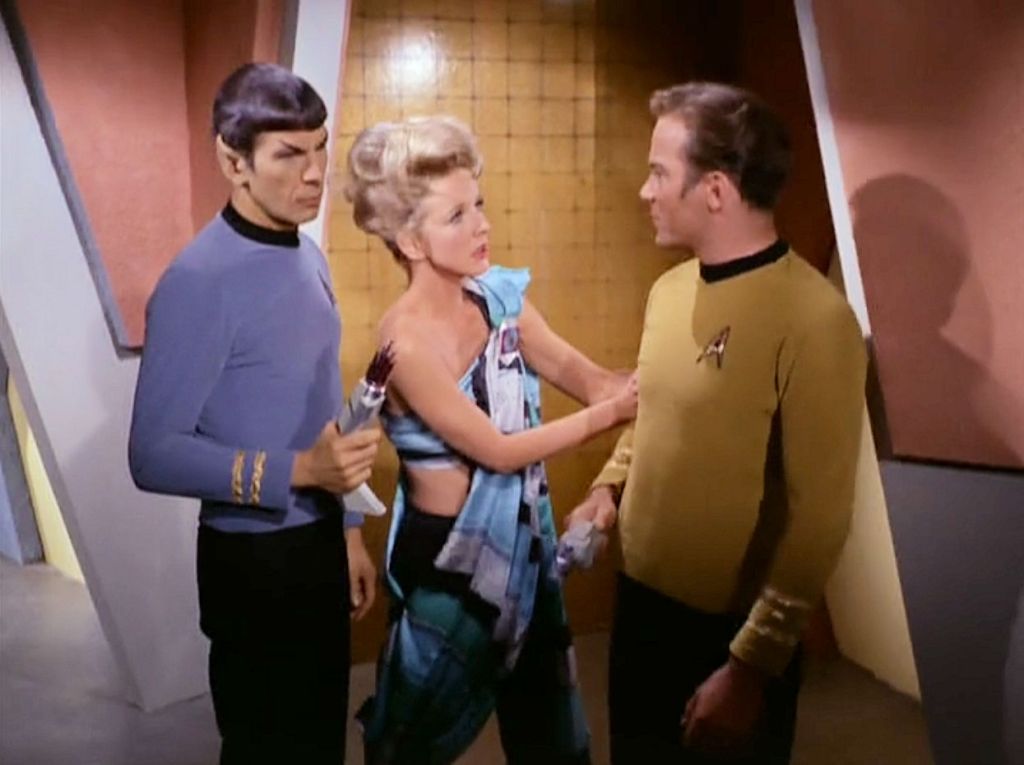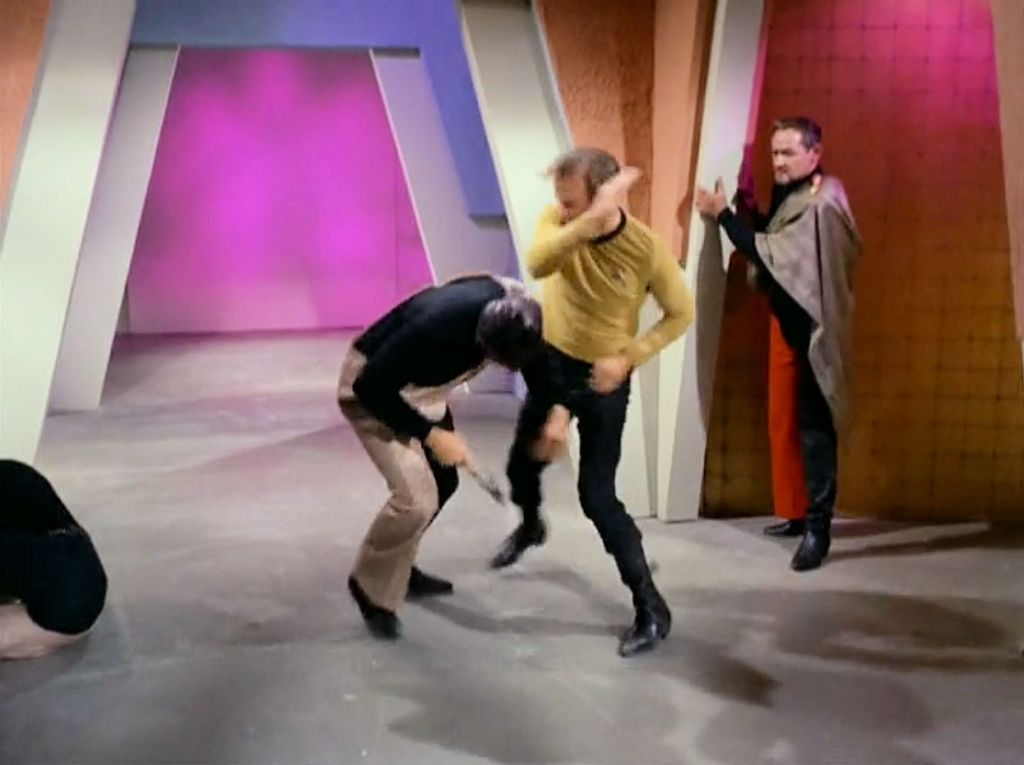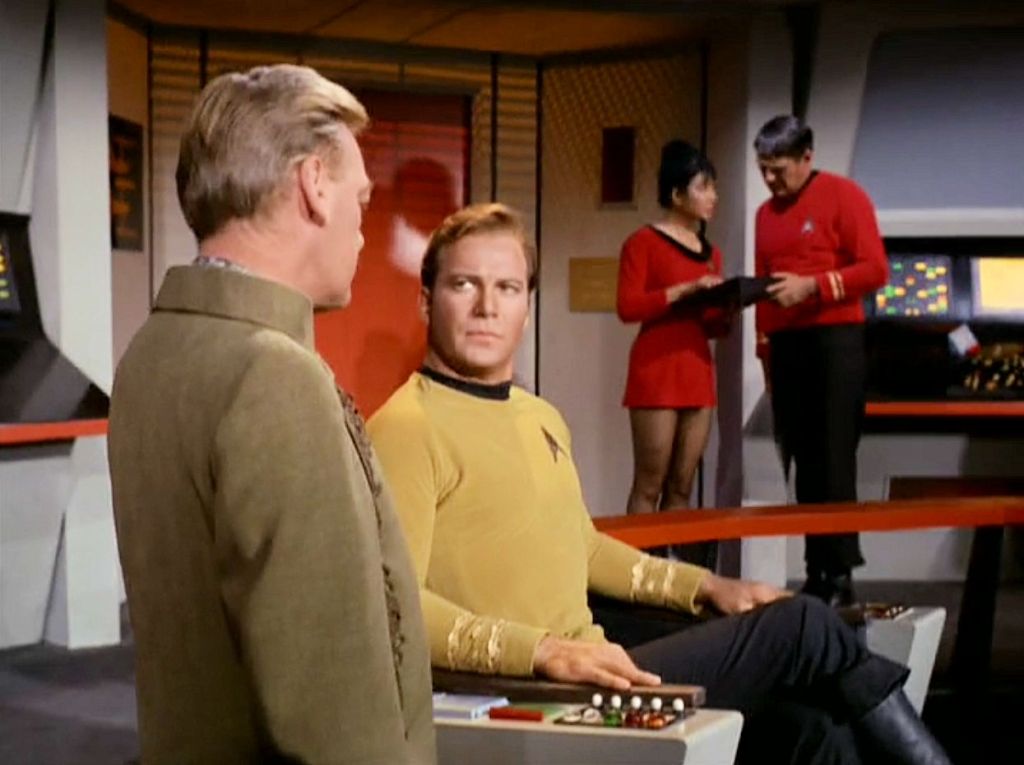(Note: If you haven’t read it yet, my introductory post on this Star Trek: The Original Series rewatch is a good place to start.)
Original Air Date: February 23, 1967
Crew Death Count: 0 (but we’re told that one to three million civilian combat casualties occur on Eminiar VII every year)
Bellybuttons: 0 (Mea 3’s wardrobe is a near miss)
“A Taste of Armageddon” is not only a conversation about war, but also demonstrates warlike behavior among its characters, so it’s perhaps no surprise that episode co-writer Robert Hamner later developed the TV series S.W.A.T. (1975-1976), about a heavily armed police force (by 1970s standards) overpowering criminals with military tactics. (The other co-writer was Gene L. Coon; together, Hamner and Coon co-wrote the short story “Attack on Planet Eminiar Seven.” I haven’t been able to locate the story, but presumably it’s the source material for “A Taste of Armageddon.”) This week, the Enterprise approaches planet Eminiar VII with Ambassador Fox (Gene Lyons) on board, intending to open diplomatic relations with the planet. When Eminiar VII responds with Code 710, which means “under no circumstances” should the Enterprise enter orbit, Fox pulls rank and orders Kirk to proceed. A landing party learns the hard way that Eminiar VII is at war with nearby Vendikar, but the war is fought entirely via computer systems that determine targets and casualties without a single weapon being fired. The entire Enterprise crew, including the landing party, are declared victims of a Vendikar attack, leading to a struggle not only for the lives of the crew, but also for the future of Eminiar VII.

“A Taste of Armageddon” is generally considered a parable on the Vietnam War, the first war broadcast daily into American living rooms via television. The episode certainly fits that interpretation; however, prior to the Tet Offensive in 1968, reporting on the war was generally favorable to U.S. conduct there: “Most reporters…spent most of their time in the South Vietnamese capital, Saigon (now Ho Chi Minh City),” as Brittanica.com reports, “and got their stories from the Joint U.S. Public Affairs Office’s daily briefings…” A significant change in tone came in February, 1968, when Walter Cronkite declared the war “mired in stalemate.” Still, when “A Taste of Armageddon” aired, there was certainly a growing antiwar movement, and an increasing awareness that most Americans were comfortably distanced from the considerable suffering taking place in southeast Asia. Although, perhaps not as distanced as they might think: inhabitants of both Eminiar VII and Vendikar share common ancestors: Vendikar was settled by explorers from Eminiar VII! National (or interstellar) borders are arbitrary and abstract. When we make war on others, we are, ultimately, making war on our own kind.
Kirk blusters through “A Taste of Armageddon” even more recklessly than he did in “The Return of the Archons,” determined to “save” a society with the zeal of a missionary. At least the inhabitants of Beta III had formed a weak resistance movement to a system they didn’t choose. Eminiar VII’s residents, on the other hand, are completely aware of the risks they live with and demonstrate no interest in change. The Eminians come across as rational and intelligent – we have no reason to believe they’re being coerced or are incapable of making this decision. Whether or not we agree with Eminiar VII’s virtual war, we can at least find some nobility in its citizens’ commitment to the path they’ve chosen. When Mea 3 (Barbara Babcock, who also voiced Trelane’s mother in “The Squire of Gothos”) learns she is a casualty and must report for “disintegration,” she is determined to fulfill her obligation as an example to others: this is not a society asking for help. Returning to the Vietnam comparison, in a 1963 interview, President Kennedy said, “I don’t think that unless a greater effort is made by the [Vietnamese] government to win popular support that the war can be won out there. In the final analysis, it’s their war, they’re the ones who have to win it or lose it.” It’s impossible to save a society that doesn’t want or need to be saved; this doesn’t even address the matter of who decides what “salvation” looks like.

Kirk’s militant attitude would be laughable if it weren’t so terrifying. “I could destroy this planet,” he says to local leader Anan 7 (David Opatoshu). He completely ignores the Prime Directive (which isn’t even mentioned in an episode that sorely needs it) and, despite being on a diplomatic mission, forgets that his primary role is to explore. When the landing party escapes, they could have simply returned to the Enterprise and withdrawn; instead, Kirk escalates the danger to both his crew and Eminiar VII. When Eminiar VII’s security personnel (whose uniforms apparently inspired the Coneheads) knock Kirk unconscious, Anan 7 says, “A man like that would have preferred to die fighting,” and from Kirk’s conduct we believe it. Finally, Kirk takes the outrageous step of issuing General Order 24 – to destroy the planet! It’s mystifying enough that Starfleet would even have such an order (as the Mission Log podcasters pointed out, we can only imagine what horrors the first 23 general orders involve), but it’s unthinkable to execute the order when walking away is a viable option. Anan 7 wisely points out the hypocrisy of Kirk professing a desire for peace before ordering the planet’s destruction.

It’s equally disturbing that Chief Engineer Scott, in command of the Enterprise during Kirk’s absence, is so willing to carry out General Order 24. Up to this point, he has conducted himself wisely. When Anan 7 imitates Kirk’s voice (how does he do that?) and tries to trick the crew into beaming down for impromptu shore leave, Scott is smart enough to question this strange order and confirm that it’s not really the captain. Later, when Ambassador Fox tries to override Scott’s orders, the engineer stands up to Fox the way Kirk should have earlier. When Scott commits to carrying out General Order 24, he trusts that it was really Kirk giving the order, and that conditions on the planet justify its complete destruction. One would think checks and balances exist for such an extreme situation, but instead Scott goes forward without question.
The rest of the crew’s performance is a mixed bag. The good news is that the landing party includes an Asian woman, Yeoman Tamura (Miko Mayama), and this yeoman isn’t along to make coffee; she gets to do actual work. Her most ironic duty is preventing Mea 3 from taking her own life, even if she has to “Knock her down and sit on her, if necessary.” McCoy, on the other hand, has resumed his role as the complainer from “The Galileo Seven.” He primarily stands around the bridge nagging Scott throughout the episode. When Scott asks the doctor if he has a better idea, we’re not surprised when he does not.

While the Vietnam War comparison works, this episode is perhaps better viewed as a cautionary tale about yielding to the algorithm. We might acknowledge the tidiness of the virtual war (“I do not approve,” Spock says, “I understand.”), but do we really believe Eminiar VII’s passive acceptance of one-million-plus war casualties is a good idea? Do we honestly believe that Facebook, Twitter, Instagram, et al, have made the world a better place? Of course, social media is the algorithmic endgame (at least, we hope there’s nothing worse up ahead), but our lives have been determined by similar probabilistic methods for decades – product placement on grocery store shelves, insurance premiums, medical treatments (often approved by calculating insurance companies rather than healthcare professionals); even popular entertainment is devised according to mathematical models rather than scientific or creative effort. One tragic outcome of this cold-hearted compartmentalization of society is how easy it is to direct the masses with propaganda. How many people, among the United States’ 330,000+ Covid-19 fatalities (as of December 26, 2020), responded to various conspiracy theories and marched to their deaths as willingly as the inhabitants of Eminiar VII? And just like Anan 7, how many elected officials find it easier to sit back and accept those deaths, rather than make a commitment to save lives?

Whether the message of “A Taste of Armageddon” is to fear war or big tech, the emotional distancing of the “victims” from their own fate is the logical extension of the same emotional distancing that drove the creation of penal colonies in “Dagger of the Mind,” or made it easier for Americans to support a distant war of imperialism in the 1960s, or promoted America’s increased use of drone warfare throughout the early 2000s. We shrug our shoulders and accept the deaths of strangers as the collateral cost of civilization (ignoring that the source of death moves closer to our own doorsteps every day); we’ve forgotten McCoy’s caution from “Balance of Terror”: “War is never imperative.” The “disintegration chambers” that Eminiar VII’s war casualties report to are functional, spotless, and harmless in appearance: little different from being in line at Disney World. Perhaps the citizens of Vendikar and Eminiar VII are so deluded by this emotional distance that they don’t even think to carry the virtual war to its logical conclusion: why not complete the video game analogy and kill only virtual victims?
It is this emotional distancing, ultimately, that Kirk rebels against. He’s disgusted by the idea of accepting war, or death, without a struggle. That both Kirk and Anan 7 escalate the situation rather than compromise turns a tactical blunder into a life-or-death ideological confrontation. Again, Kirk had the opportunity to escape with his crew. Likewise, Anan 7 could have reported these unruly intruders to Vendikar and sought a course of mutual guidance. Which brings us back to the Prime Directive, designed to avoid exactly this type of situation. Ambassador Fox is first to violate the non-interference directive the moment he ignores the Code 710 and charges forward. Fox must know earth’s history with Eminiar VII, as summarized by Spock: an earth expedition fifty years ago was never heard from again. Even Kirk acknowledges the ambassador’s poor judgement, reminding Fox, “It is their planet.” Fox’s argument is that “thousands” of lives have been lost unnecessarily because the Federation lacks a “treaty port” in the system. Refusing to divert traffic around an openly hostile system is a flimsy argument for ignoring the “Here there be dragons” sign and risking interplanetary war.

“A Taste of Armageddon” reminds me of a large-scale, never-ending, version of Fail-Safe, the 1962 novel by Eugene Burdick and Harvey Wheeler, later adapted as a motion picture by director Sidney Lumet. (Massive Fail-Safe spoilers ahead.) Set in the 1960s, when a technical glitch causes a U.S. nuclear bomber to strike Moscow, the U.S. president is forced to prove the act is an error to prevent a Soviet counterstrike and all-out nuclear war: finding no other option, he sacrifices a comparably-sized U.S. target by voluntarily bombing New York City. It’s a heartbreaking but thought-provoking solution, finding ourselves on the deserving end of a proportional response. Whatever nobility we find in the Fail-Safe approach, however, it’s a one-time affair. We could not accept the U.S. president and Soviet premier trading cities indefinitely. Eminiar VII (and Vendikar, no doubt, though we never see it) seems to have reached a point of political and cultural stasis (“comfortable for your people,” as Spock describes it), stable but never striving for growth or progress, every day another Fail-Safe exercise. This may seem wrong to us, but the fact remains: who are we to judge? This is the heart of the Prime Directive and the conversation “A Taste of Armageddon” needs. Kirk leaves Eminiar VII in a terribly vulnerable position; the tidy wrapping-up scene (again reminiscent of “The Return of the Archons”) delivers encouraging news of a hopeful conversation between the two planets. Matters could easily have turned out differently, though, and Kirk clearly hasn’t learned his lesson. He was wise enough to prefer non-interference initially, but went on to make a bad situation much worse. The strength of Fail-Safe, the vital element missing from “A Taste of Armageddon,” is a forced reckoning with our own mistakes. Just as Eminiar VII is at war with their own kind, the hard truth is that we are nearly always our own worst enemy.
Next: This Side of Paradise